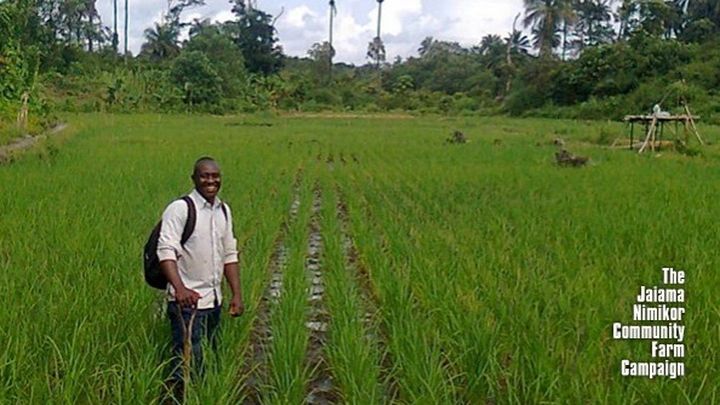
Sustainable Food-Sierra Leone
Donation protected
Ken White is raising money to grow needed rice during the Ebola virus crisis in Sierra Leone.
"I probably should've left when the Peace Corps teachers pulled out, but I didn't. I'm 'The Farmer,' Ken White, an American from the U.S. who came to Jaiama, Sierra Leone, a year ago with a company that was going to mine. When the company moved back to America, I stayed on and began farming. I'm literally in a swamp all day, growing rice. The labor isn't easy, but if I can get more plants in the ground now, I can help feed people!"
"My farming isn't just about the rice; it's about kids and families and extended families; it's about helping them be self-sufficient. There are not many jobs around here and families have to pay for children to attend school so they appreciate the jobs I provide, especially since I pay wages competitive with miners' earnings. Right now, I have 6 boys and 2 girls working summer jobs in the fields. I provide them a hot meal while working and send them home later with earnings that pay their school fees and help put food on the table for themselves and others. Most of my workers will only eat one meal a day, the one that I provide with their job. In this extended family society – when one person has a job, aunts and uncles, mom and dad, siblings, babies, spouses and other relatives benefit. At the height of my development, when I had almost 30 people working in the fields, I pictured upwards of 200 people enjoying food later that week, and I was blessed as they were."
"I need your help…right now. I have 6 additional acres that I need to get leveled, prepped and planted. This ground can provide nearly 20 tons of rice a year for the community...enough to feed about 30 families in the local community for a year. For twenty years!"
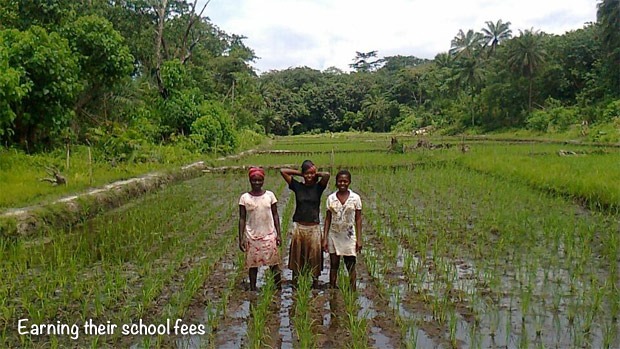
THE FACTS
Getting this done requires money, about $3,000 per acre.
The Sierra Leone region has been unable to meet the increasing demand for food through local rice production; therefore, approximately 60% of the rice must be imported. Ken’s goal is to increase local production, give people jobs, train them to be self-sufficient, and expand this throughout neighboring areas.
In order to develop an intensive rice culture, it will be necessary to undertake the following measures:
- Practice rice-based cropping systems that include grain and legumes to improve soil fertility.
- Incorporate crop residue into the soil to improve the soil organic matter content and fertility
- Adopt erosion control methods to prevent rapid soil degradation
- Adopt water-harvesting methods to reduce the risk of drought and enhance crop yields
- Increase productivity through lowland rice farms, utilizing System of Rice Intensification (SRI) methods and fast high yield rice varieties.
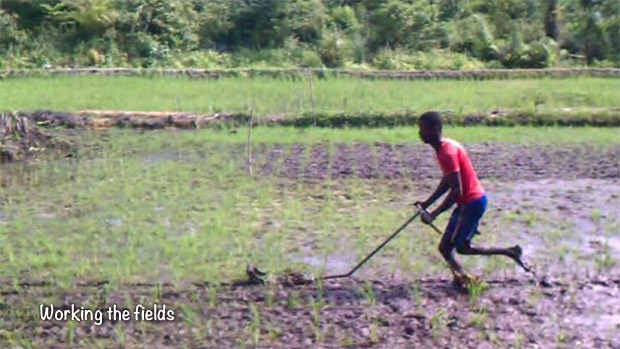
EBOLA IN SIERRA LEONE
Not many companies want, or can afford, to be here in Jaiama especially with the spread of Ebola. This deadly virus which infects humans and nonhuman primates is now in epidemic proportions throughout West Africa killing up to 90% of its human victims. Here in the Kono District, what would normally be a bustling roadside market day on Friday is now subdued. Absent are the colorful umbrellas that appeared each week like blooming flowers providing shade to the vendors whose tables lined the market road. Gone is the milling, chatting crowd of locals and residents from the surrounding villages and towns. Ebola has changed the way of life in Africa.
The other night the town crier announced at 4 o’clock in the morning, that everyone was to heat up salt water and wash or bathe. All new persons entering the town must now check in with local authorities. On Monday there was a national day of reflection; everyone in the country had to stay at home. Restrictions are in place.
In the larger town of Koidu a dozen miles away, bars/cinemas for sports watching, the marketplace, and all large gatherings have been banned. A curfew has been implemented on vehicle travel. Banks have set up large drinking water coolers filled with a chlorine water mixture. Guards require all persons entering the buildings to wash their hands from the taps of the coolers. Travel limitations, quarantines, and roadside checkpoints are in place.
While these measures can help slow the spread of the Ebola virus, they are creating food shortages causing prices to skyrocket. A bag of rice a month ago cost 125,000 Leones, that same bag is now 180,000! An amount of dried fish that cost 20,000 is now 70,000! The struggle to put food on the family table has intensified.
Your donations will help prepare the fields and immediately thereafter plant the paddies.
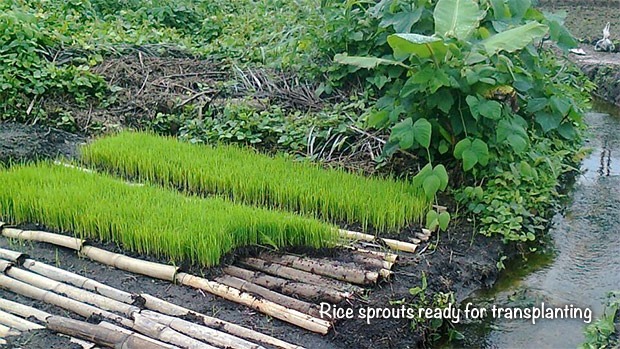
THE CAMPAIGN SUMMARY
Ken White is raising money to hire workers to develop 6 acres of land in the Nimikor Chiefdom to grow rice to help alleviate the food shortages now occurring as a result of the Ebola virus-related restrictions gripping Sierra Leone. The 6 acres of land are part of a 30-acre swamp complex that Ken has leased from 5 different owners, giving him exclusive use rights to all lands.
Ken began "The Jaiama Nimikor Community Farm" on April 9th, 2014. He has already completed full development activities on half a dozen of the lowland acres with impressive results considering the work he completed in 120 days typically takes local communities 3 years to complete!
Additionally, in this same 120-day time period, Ken has completed development on 80 percent of one additional acre of lowland and has completed other activities on another 5 acres of lowlands. It is this additional 6 acres that are going to be funded by this campaign.
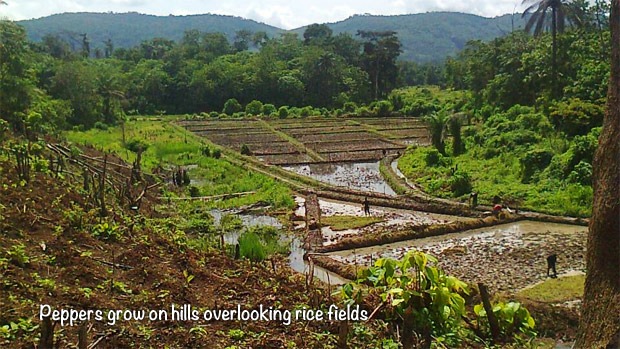
MORE FROM KEN
"My work hasn't stopped with the rice fields. Within this same 120-day period, I also cleared the bush from 5 acres of upland for a pepper farm. I have completed the transplanting of approximately 8000 pepper plants that are in the ground and growing! I’m exhausted, but pleased that some say I am now the largest private farmer in the District. Maybe I am…maybe someday."
"I was born and raised in California; the state is the 2nd largest producer of rice in America. I am half Filipino. Filipinos eat and grow more rice than anyone I know. I must have a rice gene. At 55 years of age (in October) I thought I'd be happily receiving my senior discount at a Denny's restaurant, drinking hot coffee and eating a Grand Slam breakfast. Instead I'll be waking up before light to the shrill crowing of a rooster, donning damp work clothes, stuffing my aching feet into ill-fitting rubber boots, and making a cup of instant coffee with water that tastes of chlorine from the purification tablet. I'll spend my day dragging around muddy boots in a swamp grateful for the endurance and discipline I developed as a high school athlete and a U.S. Marine. I don't think I could have accomplished what I have on the farm without these two attributes."
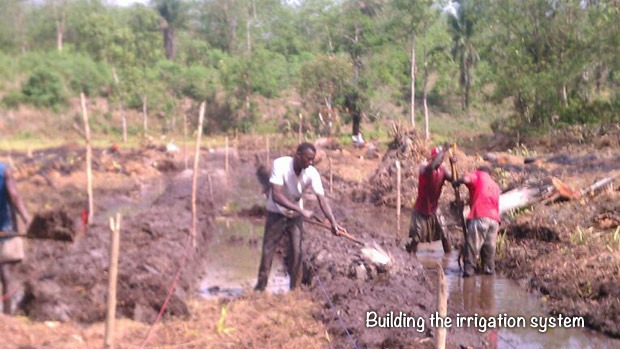
"Working conditions in a swamp, in the bush, are not easy. I've been bit, sprained, cut, scratched, tripped, stuck, and sucked by leeches! Had my flesh eaten by bacteria; suffered twice with malaria; ended many days drenched with sweat and muddy water; beat up, run hard, tired to the bone…and that's just Mondays! Swamping is hard work, it's not really fun, but the results are so rewarding."
"My main goal, my purpose here, my vision, is to grow rice commercially while teaching farmers higher yield methods for rice production, all while creating jobs, and raising up new leaders in agriculture."
"In Junior High School I had a teacher, Mr. Ratcliffe, I think was his name. If he said it once he said it a thousand times to us kids, "Feed a man a fish and you'll feed him for a day. Teach him how to fish and he'll feed himself for the rest of his life."
"I have the privilege and the opportunity to make a difference in people's lives here… and so do you. Please, help make a difference."
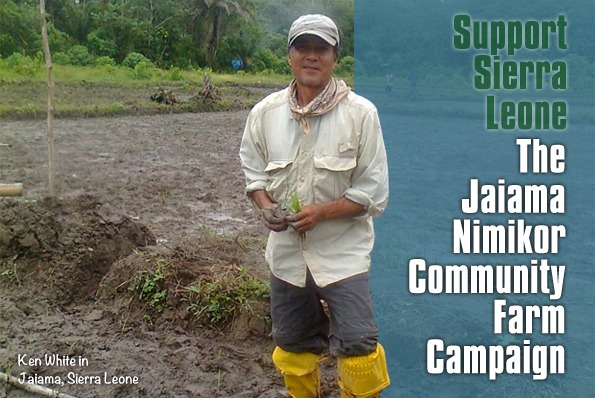
NOW, NOT LATER
"There's a window of opportunity that is open. I need money to hire the labor to grow more rice now, not later. With your funding, I will get the work done to make more rice available to the people who need it here. I have a trained, motivated, and determined crew of workers that are willing to literally plunge into the swamp and start working."
"The Ebola virus is here; the need here is real. Today is the day…the day you can make a difference."
"Don't wait, help now. Help often during this campaign. Thank you and God bless you."
- Ken White.
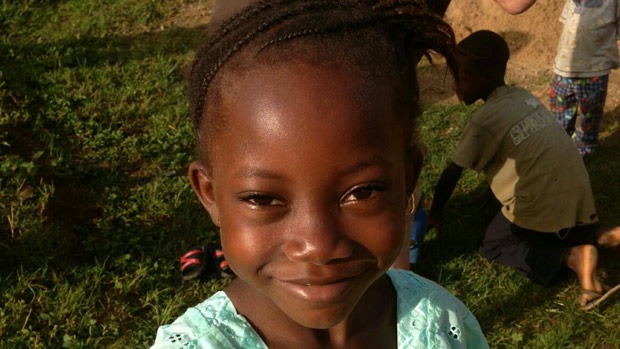
OTHER WAYS YOU CAN HELP
Spread the word about our work by sharing our GoFundMe page with your friends, family and co-workers through Facebook and email. Share with family, friends, coworkers, colleagues. Phone, email, speak to them in person. Ten minutes of your time can help grow a lot of rice.
http://www.gofundme.com/jaiama-nimikor-cf
https://www.facebook.com/thejaiamanimikorcommunityfarm
Get creative; use your Twitter, Instagram, SnapChat, even LinkedIn. Use Xanga, Friendster, anything to help spread the word.
- Thank You!
"I probably should've left when the Peace Corps teachers pulled out, but I didn't. I'm 'The Farmer,' Ken White, an American from the U.S. who came to Jaiama, Sierra Leone, a year ago with a company that was going to mine. When the company moved back to America, I stayed on and began farming. I'm literally in a swamp all day, growing rice. The labor isn't easy, but if I can get more plants in the ground now, I can help feed people!"
"My farming isn't just about the rice; it's about kids and families and extended families; it's about helping them be self-sufficient. There are not many jobs around here and families have to pay for children to attend school so they appreciate the jobs I provide, especially since I pay wages competitive with miners' earnings. Right now, I have 6 boys and 2 girls working summer jobs in the fields. I provide them a hot meal while working and send them home later with earnings that pay their school fees and help put food on the table for themselves and others. Most of my workers will only eat one meal a day, the one that I provide with their job. In this extended family society – when one person has a job, aunts and uncles, mom and dad, siblings, babies, spouses and other relatives benefit. At the height of my development, when I had almost 30 people working in the fields, I pictured upwards of 200 people enjoying food later that week, and I was blessed as they were."
"I need your help…right now. I have 6 additional acres that I need to get leveled, prepped and planted. This ground can provide nearly 20 tons of rice a year for the community...enough to feed about 30 families in the local community for a year. For twenty years!"

THE FACTS
Getting this done requires money, about $3,000 per acre.
The Sierra Leone region has been unable to meet the increasing demand for food through local rice production; therefore, approximately 60% of the rice must be imported. Ken’s goal is to increase local production, give people jobs, train them to be self-sufficient, and expand this throughout neighboring areas.
In order to develop an intensive rice culture, it will be necessary to undertake the following measures:
- Practice rice-based cropping systems that include grain and legumes to improve soil fertility.
- Incorporate crop residue into the soil to improve the soil organic matter content and fertility
- Adopt erosion control methods to prevent rapid soil degradation
- Adopt water-harvesting methods to reduce the risk of drought and enhance crop yields
- Increase productivity through lowland rice farms, utilizing System of Rice Intensification (SRI) methods and fast high yield rice varieties.

EBOLA IN SIERRA LEONE
Not many companies want, or can afford, to be here in Jaiama especially with the spread of Ebola. This deadly virus which infects humans and nonhuman primates is now in epidemic proportions throughout West Africa killing up to 90% of its human victims. Here in the Kono District, what would normally be a bustling roadside market day on Friday is now subdued. Absent are the colorful umbrellas that appeared each week like blooming flowers providing shade to the vendors whose tables lined the market road. Gone is the milling, chatting crowd of locals and residents from the surrounding villages and towns. Ebola has changed the way of life in Africa.
The other night the town crier announced at 4 o’clock in the morning, that everyone was to heat up salt water and wash or bathe. All new persons entering the town must now check in with local authorities. On Monday there was a national day of reflection; everyone in the country had to stay at home. Restrictions are in place.
In the larger town of Koidu a dozen miles away, bars/cinemas for sports watching, the marketplace, and all large gatherings have been banned. A curfew has been implemented on vehicle travel. Banks have set up large drinking water coolers filled with a chlorine water mixture. Guards require all persons entering the buildings to wash their hands from the taps of the coolers. Travel limitations, quarantines, and roadside checkpoints are in place.
While these measures can help slow the spread of the Ebola virus, they are creating food shortages causing prices to skyrocket. A bag of rice a month ago cost 125,000 Leones, that same bag is now 180,000! An amount of dried fish that cost 20,000 is now 70,000! The struggle to put food on the family table has intensified.
Your donations will help prepare the fields and immediately thereafter plant the paddies.

THE CAMPAIGN SUMMARY
Ken White is raising money to hire workers to develop 6 acres of land in the Nimikor Chiefdom to grow rice to help alleviate the food shortages now occurring as a result of the Ebola virus-related restrictions gripping Sierra Leone. The 6 acres of land are part of a 30-acre swamp complex that Ken has leased from 5 different owners, giving him exclusive use rights to all lands.
Ken began "The Jaiama Nimikor Community Farm" on April 9th, 2014. He has already completed full development activities on half a dozen of the lowland acres with impressive results considering the work he completed in 120 days typically takes local communities 3 years to complete!
Additionally, in this same 120-day time period, Ken has completed development on 80 percent of one additional acre of lowland and has completed other activities on another 5 acres of lowlands. It is this additional 6 acres that are going to be funded by this campaign.

MORE FROM KEN
"My work hasn't stopped with the rice fields. Within this same 120-day period, I also cleared the bush from 5 acres of upland for a pepper farm. I have completed the transplanting of approximately 8000 pepper plants that are in the ground and growing! I’m exhausted, but pleased that some say I am now the largest private farmer in the District. Maybe I am…maybe someday."
"I was born and raised in California; the state is the 2nd largest producer of rice in America. I am half Filipino. Filipinos eat and grow more rice than anyone I know. I must have a rice gene. At 55 years of age (in October) I thought I'd be happily receiving my senior discount at a Denny's restaurant, drinking hot coffee and eating a Grand Slam breakfast. Instead I'll be waking up before light to the shrill crowing of a rooster, donning damp work clothes, stuffing my aching feet into ill-fitting rubber boots, and making a cup of instant coffee with water that tastes of chlorine from the purification tablet. I'll spend my day dragging around muddy boots in a swamp grateful for the endurance and discipline I developed as a high school athlete and a U.S. Marine. I don't think I could have accomplished what I have on the farm without these two attributes."

"Working conditions in a swamp, in the bush, are not easy. I've been bit, sprained, cut, scratched, tripped, stuck, and sucked by leeches! Had my flesh eaten by bacteria; suffered twice with malaria; ended many days drenched with sweat and muddy water; beat up, run hard, tired to the bone…and that's just Mondays! Swamping is hard work, it's not really fun, but the results are so rewarding."
"My main goal, my purpose here, my vision, is to grow rice commercially while teaching farmers higher yield methods for rice production, all while creating jobs, and raising up new leaders in agriculture."
"In Junior High School I had a teacher, Mr. Ratcliffe, I think was his name. If he said it once he said it a thousand times to us kids, "Feed a man a fish and you'll feed him for a day. Teach him how to fish and he'll feed himself for the rest of his life."
"I have the privilege and the opportunity to make a difference in people's lives here… and so do you. Please, help make a difference."

NOW, NOT LATER
"There's a window of opportunity that is open. I need money to hire the labor to grow more rice now, not later. With your funding, I will get the work done to make more rice available to the people who need it here. I have a trained, motivated, and determined crew of workers that are willing to literally plunge into the swamp and start working."
"The Ebola virus is here; the need here is real. Today is the day…the day you can make a difference."
"Don't wait, help now. Help often during this campaign. Thank you and God bless you."
- Ken White.

OTHER WAYS YOU CAN HELP
Spread the word about our work by sharing our GoFundMe page with your friends, family and co-workers through Facebook and email. Share with family, friends, coworkers, colleagues. Phone, email, speak to them in person. Ten minutes of your time can help grow a lot of rice.
http://www.gofundme.com/jaiama-nimikor-cf
https://www.facebook.com/thejaiamanimikorcommunityfarm
Get creative; use your Twitter, Instagram, SnapChat, even LinkedIn. Use Xanga, Friendster, anything to help spread the word.
- Thank You!
SO WHO IS DAVID?
David is a close friend of Ken White. Since Ken is in West Africa and internet is very limited, David is acting as Ken's helper in the U.S. getting the campaign launched and managing Facebook and other social media.
David is a close friend of Ken White. Since Ken is in West Africa and internet is very limited, David is acting as Ken's helper in the U.S. getting the campaign launched and managing Facebook and other social media.
Organizer
David Sakach
Organizer
Dana Point, CA
Inspired to help? Start a fundraiser for someone you know


